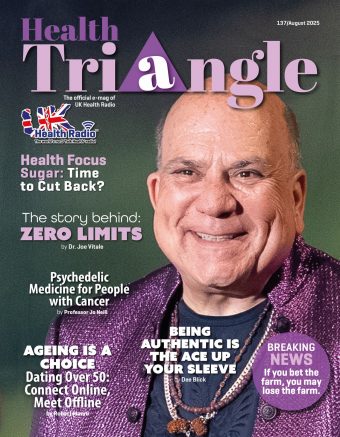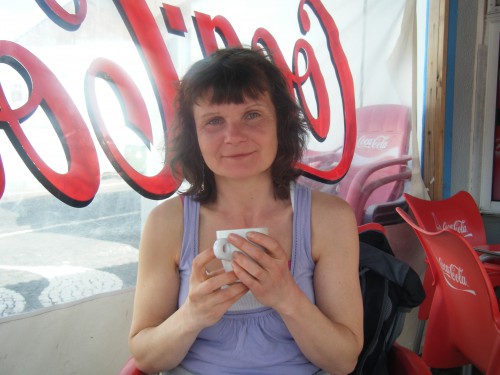By UK Health Radio guest contributor, Vivien Ryder
Some of the longest-lived peoples seem to possess an innate ability to find balance in all things, in other words a way of living within the flow of nature and her seasons. In so doing, such cultures have produced amazingly strong and healthy people without the need to pollute the planet.
The Hunzakuts of Pakistan are a fine example of this, often living to a remarkably agile old age, usually maintaining their faculties for all their long lives. A simple diet, based around grains, vegetables, a little dairy and the famous Hunza apricot seems to be the key.
Similarly, the Okinawans who live off the coast of Japan, rely on locally grown fare and display a similarly fine (at least compared to us in the West) quality of life.
Hippocrates
This way of living is known as Macrobiotic, a term first used by Hippocrates, the father of Medicine. He used this word to describe people who were healthy and long-lived, due to a lifestyle revolving around a simple, balanced diet. Indeed the word Macrobiotics is Greek for Big Life.
Macrobiotics – a universal concept
Macrobiotics is a universal concept that suggests eating a natural diet based around foods that are available locally, will lead to health, longevity and harmony with the planet. For a climate like ours, it is suggested that such a diet would consist of whole grains, beans, vegetables, fruit and small amounts of animal foods.
In the early 1900s a remarkable man, George Oshawa, introduced this regime to the West. Indeed, with the aid of a simple diet based around the consumption of brown rice and vegetables, he recovered from tuberculosis. He spent the rest of his life re-igniting these ancient principles.
Living energy
We all have living energy flowing through our bodies. Similarly, all vegetal foods in their natural state contain living energy. If we eat foods grown in our own climate and in season we take on the energy of that climate and season, thus strengthening our connection with the pulse of nature. Over time this leads to an instinct with regard to our own needs and to the needs of the environment. The desire for sweets, excess meat and processed food (all considered too extreme) often diminishes, as does the need to take more from nature than we truly need.
Yin and yang
At its root Macrobiotics looks to an awareness of the changes that take place in nature. By studying these changes we can thus rekindle that innate ability to live within this natural order.
Night changes to day. Winter changes to spring. Nothing stays the same. A useful way to categorize such changes is the concept of yin and yang.
Yin is the tendency to expand outwards. Yang is the tendency to contract inwards. Yin always follows yang and yang always follows yin.
Classifying foods
According to Macrobiotics we classify foods into more yin and more yang according to how each food affects the body. As a general rule sweet foods tend to be more yin and salty foods more yang. The concept is that illness is due to some kind of imbalance in these yin/yang energies. We all know that too much sweet food can lead to blood sugar problems and that too much salt can lead to high blood pressure. By building on this and studying foods and lifestyle factors more closely, we can use the yin and yang energies of food to bring about balance.
Foods can be classified into three main groups:
moderate foods for regular use and which create a balancing effect, include grains, vegetables, beans, seeds and some fruits.
extreme yin foods which create softness and other expansive effects include tropical fruits, sugar, coffee and drugs
extreme yang foods which create hardness, tightness and other contractive effects on body and mind include red meat, eggs and refined salt.
How?
For balance the suggested proportions of such foods are as follows:
50 to 60% whole grains, 20 to 30% vegetables, 10% pulses and beans, about 10% fruits and the rest would be made up of seeds, nuts and condiments such as soya sauce and other sea salt-based products.
Everybody is different and the suggestions are simply guidelines. Some of us require more animal foods than others. There is nothing fixed about this way of eating and living. When in good health we can eat anything – from time to time.
Development of plants – human evolution
In parallel with the line of animal evolution is a line of plant development. In Macrobiotic philosophy it is said that humans evolved in parallel with whole grains and that they should therefore form the main part of our diet. This makes sense. Grains are full of complex carbohydrates, fibre, vitamins, minerals and life energy when eaten in their natural form. Their cultivation makes both economic and ecological sense.
Oranges are not the only fruit
Vitamin C is a very important nutrient but this does not make oranges a necessary part of our diet, although the occasional orange will do no harm. Oranges are grown in warmer climates than our own and their regular consumption is more appropriate for people who live in such climates. We can find all the essential nutrients within a balanced Macrobiotic diet – with the help of a bit of fermentation.
Get pickling
Fermented foods are an important part of any healthy diet. They are an aid in the production of certain nutrients in the gut and increase our resistance to infections etc. Miso, sauerkraut and other pickled vegetables are all fermented foods and contain important beneficial bacteria along with all the original nutrients of the fresh raw vegetable (e.g. vitamin C). Every long-lived people consume some kind of fermented food on a regular basis.
Cancer cure?
Many people have used Macrobiotics as a tool to help cure themselves of terminal illnesses, in particular cancer. This regime is a powerful way of cleansing the body of accumulated toxins. Re-establishing balance in a sick body can affect not only its physical state but also mind and soul. The effect of such a shift can result in a far more optimistic outlook on life. Indeed, people have often found a purpose in life (that was previously lacking) as a direct result of overcoming illness through Macrobiotics.
Nutritious enough?
The Macrobiotic regime suggests we all have different nutrient requirements. Balance is the key. All nutrients work together and it is important that there is a balance between the levels of all nutrients (some of which we simply do not fully understand yet) in order that they can carry out the necessary chemical and biological reactions in the body. As long as general Macrobiotic suggestions are followed deficiencies should not occur.
There are no hard and fast rules. No food is prohibited. There are general guidelines and this really is the most important rule.
Cooking
As is the case with any healthy way of eating, cooking is essential. Food, as far as possible, should be cooked in near natural state as possible, thereby retaining full nutrient value and life force. All food should be chewed well to aid digestion. There are plenty of Macrobiotic cooking books available. (Avelyne Kushi’s ‘Macrobiotic Cooking’ takes you through the basics.)
Simplify your life
We all want our lives to be simpler. By eating simple and nutritious foods, clarity of mind ensues and we can go back to feeling truly human again.
(Denny Waxman’s ‘The Great Life Diet’ and ‘The Hip Chick’s Guide to Macrobiotics’ by Jessica Porter both provide a lively introduction to this philosophy. Both are available through Amazon.)
|
more yang more yin
contractive expansive
fire water
hot cold
heaviness lightness
inner outer
drier wetter
more active passive
summer winter
day night
time space |
Please note that all information and content on UK Health Radio and this blog are provided by the authors, producers and companies themselves and are only intended as additional information to your general knowledge and not as a substitute for professional medical advice or treatment. So please do not delay or disregard any medical advice received due to information gathered on UK Health Radio.
UK Health Radio – the health radio station for the United Kingdom, Europe and beyond at www.ukhealthradio.com – is kindly sponsored by www.1-stop-health-shop.com









